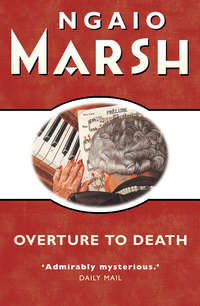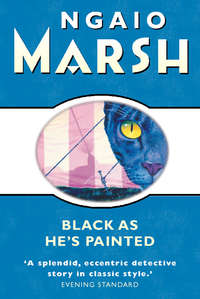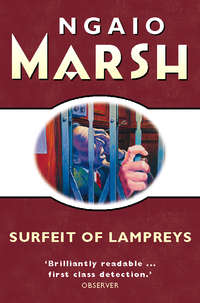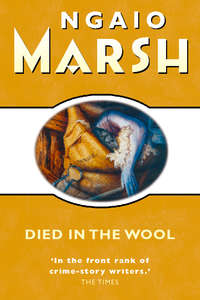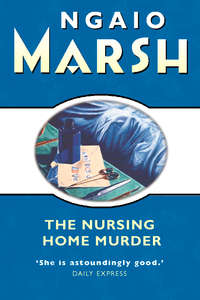
Полная версия
Inspector Alleyn 3-Book Collection 5: Died in the Wool, Final Curtain, Swing Brother Swing

NGAIO MARSH
Ngaio Marsh Volume 5

Copyright
HARPER
an imprint of HarperCollinsPublishers 1 London Bridge Street London SE1 9GF
www.harpercollins.co.uk
Died in the Wool first published in Great Britain by Collins 1945 Final Curtain first published in Great Britain by Collins 1947 Swing, Brother, Swing first published in Great Britain by Collins 1949 I Can Find My Way Out first published Great Britain in Death on the Air and Other Stories by HarperCollinsPublishers 1995
Ngaio Marsh asserts the moral right to be identified as the author of these works
Copyright © Ngaio Marsh Ltd 1945, 1947, 1949
I Can Find My Way Out copyright © Ngaio Marsh (Jersey) Ltd 1989 Cover design © crushed.co.uk
A catalogue copy of this book is available from the British Library.
This novel is entirely a work of fiction. The names, characters and incidents portrayed in it are the work of the author’s imagination. Any resemblance to actual persons, living or dead, events or localities is entirely coincidental.
All rights reserved under International and Pan-American Copyright Conventions. By payment of the required fees, you have been granted the nonexclusive, nontransferable right to access and read the text of this e-book on-screen. No part of this text may be reproduced, transmitted, downloaded, decompiled, reverse engineered, or stored in or introduced into any information storage and retrieval system, in any form or by any means, whether electronic or mechanical, now known or hereinafter invented, without the express written permission of HarperCollins e-books.
Source ISBN: 9780007328734
Ebook Edition © October 2013 ISBN: 9780007531394
Version 2018-02-08
Contents
Cover
Title Page
Copyright
Died in the Wool
Final Curtain
Swing, Brother, Swing
Excerpt from: I Can Find My Way Out
Also by the Author
About the Publisher
Contents
Title Page
Cast of Characters
Prologue – 1939–1942
1 Alleyn at Mount Moon
2 According to Ursula Harme
3 According to Douglas Grace
4 According to Fabian Losse
5 According to Terence Lynne
6 According to the Files
7 According to Ben Wilson
8 According to Cliff Johns
9 Attack
10 Night Piece
11 According to Arthur Rubrick
Epilogue – According to Alleyn
PROLOGUE
1939.
‘I am Mrs Rubrick of Mount Moon,’ said the golden-headed lady. ‘And I should like to come in.’
The man at the stage-door looked down into her face. Its nose and eyes thrust out at him, pale, all of them, and flecked with brown. Seen at close quarters these features appeared to be slightly out of perspective. The rest of the face receded from them, fell away to insignificance. Even the mouth with its slightly projecting, its never quite hidden teeth, was forgotten in favour of that acquisitive nose, those protuberant exacting eyes. ‘I should like to come in,’ Flossie Rubrick repeated.
The man glanced over his shoulder into the hall. ‘There are seats at the back,’ he said. ‘Behind the buyers’ benches.’
‘I know there are. But I don’t want to see the backs of the buyers. I want to watch their faces. I’m Mrs Rubrick of Mount Moon and my wool clip should be coming up in the next half-hour. I want to sit up here somewhere.’ She looked beyond the man at the door, through a pair of scenic book-wings to the stage where an auctioneer in shirt-sleeves sat at a high rostrum, gabbling. ‘Just there,’ said Flossie Rubrick, ‘on that chair by those painted things. That will do quite well.’ She moved past the man at the door. ‘How do you do?’ she said piercingly as she came face-to-face with a second figure. ‘You don’t mind if I come in, do you? I’m Mrs Arthur Rubrick. May I sit down?’
She settled herself on a chair she had chosen, pulling it forward until she could look through an open door in the proscenium and down into the front of the house. She was a tiny creature and it was a tall chair. Her feet scarcely reached the floor. The auctioneer’s clerks who sat below his rostrum, glanced up curiously from their papers.
‘Lot one seven six,’ gabbled the auctioneer. ‘Mount Silver.’
‘Eleven,’ a voice shouted.
In the auditorium two men, their arms stretched rigid, sprang to their feet and screamed. ‘Three!’ Flossie settled her furs and looked at them with interest. ‘Eleven-three,’ said the auctioneer.
The chairs proper to the front of the hall had been replaced by rows of desks, each of which was labelled with the name of its occupant’s firm. Van Huys. Riven Bros. Dubois. Yen. Steiner. James Ogden. Hartz. Ormerod. Rhodes. Markino. James Barnett. Dressed in business men’s suits woven from good wool, the buyers had come in from the four corners of the world for the summer wool sales. They might have been carefully selected types, so eloquently did they display their nationality. Van Huys’s buyer with his round wooden head and soft hat, Dubois’s, sleek, with a thin moustache and heavy grooves running from his nostrils to the corners of his mouth, old Jimmy Ormerod who bought for himself, screamed like a stallion, and turned purple in the face, Hartz with horn-rimmed glasses who barked, and Mr Kurata Kan of Markino’s with his falsetto yelp. Each buyer held printed lists before him, and from time to time, like a well-trained chorus-ensemble, they would all turn a page. The auctioneer’s recital was uninflected, and monotonous; yet, as if the buyers were marionettes and he their puppet-master, they would twitch into violent action and as suddenly return to their nervously intent immobility. Some holding the papers before their eyes, stood waiting for a particular wool clip to come up. Others wrote at their desks. Each had trained himself to jerk in a flash from watchful relaxation into spreadeagled yelling urgency. Many of them smoked continuously and Flossie Rubrick saw them through drifts of blue tobacco clouds.
In the open doorways and under the gallery stood groups of men whose faces and hands were raddled and creased by the sun and whose clothes were those of the country man in town. They were the wool-growers, the run-holders, the sheep-cockies, the back-countrymen. Upon the behaviour of the buyers their manner of living for the next twelve months would depend. The wool sale was what it all amounted to; long musters over high country, nights spent by shepherds in tin huts on mountain sides, late snows that came down into lambing paddocks, noisy rituals of dipping, crutching, shearing; the final down-country journey of the wool bales – this was the brief and final comment on the sheep man’s working year.
Flossie saw her husband, Arthur Rubrick, standing in a doorway. She waved vigorously. The men who were with Arthur pointed her out. He gave her a dubious nod and began to make his way along a side aisle towards her. As soon as he reached the steps that led from the auditorium up to her doorway she called out in a sprightly manner. ‘Look where I’ve got to! Come up and join me!’ He did so but without enthusiasm.
‘What are you doing up here, Floss?’ he said. ‘You ought to have gone down below.’
‘Down below wouldn’t suit me at all.’
‘Everyone’s looking at you.’
‘That doesn’t embarrass me,’ she said loudly. ‘When will he get to us, darling? Show me.’
‘Ssh!’ said her husband unhappily and handed her his catalogue. Flossie made play with her lorgnette. She flicked it open modishly with white-gloved hand and looked through it at the lists. There was a simultaneous flutter of white paper throughout the hall. ‘Over we go, I see,’ said Flossie and turned a page. ‘Now, where are we?’
Her husband grunted urgently and jerked up his head.
‘Lot one eighty,’ gabbled the auctioneer.
‘Thirteen.’
‘Half!’ yelled old Ormerod.
‘Three!’
‘Fourteen!’
The spectacled Mr Kurata Kan was on his feet, yelping, a fraction of a second quicker than Ormerod.
‘Top price,’ cried Flossie shrilly. ‘Top price! Isn’t it, darling? We’ve got top price, haven’t we? That dear little Jap!’
A ripple of laughter ran through the hall. The auctioneer grinned. The two men near the stage-door moved away, their hands over their mouths. Arthur Rubrick’s face, habitually cyanosed, deepened to a richer purple. Flossie clapped her white gloves together and rose excitedly. ‘Isn’t he too sweet,’ she demanded. ‘Arthur, isn’t he a pet?’
‘Flossie, for God’s sake,’ Arthur Rubrick muttered.
But Flossie made a series of crisp little nods in the direction of Mr Kurata Kan and at last succeeded in attracting his attention. His eyelids creased, his upper lip lifted in a crescent over his long teeth and he bowed.
‘There!’ said Flossie in triumph as she swept out at the stage-door, followed by her discomforted husband. ‘Isn’t that splendid?’
He piloted her into a narrow yard. ‘I wish you wouldn’t make me quite so conspicuous, my dear,’ he said. ‘I mean, waving to that Jap. We don’t know him or anything.’
‘No,’ cried Flossie. ‘But we’re going to. You’re going to call on him, darling, and we shall ask him to Mount Moon for the weekend.’
‘Oh, no, Flossie. Why? Why on earth?’
‘I’m all for promoting friendly relations. Besides he’s paid top price for my wool. He’s a sensible man. I want to meet him.’
‘Grinning little pip-squeak. I don’t like ’em, Floss. Do you in the eye for tuppence, the Japs would. Any day. They’re our natural enemies.’
‘Darling, you’re absolutely antediluvian. Before we know where we are you’ll be talking about The Yellow Peril.’
She tossed her head and a lock of hair dyed a brilliant gold slipped down her forehead. ‘Do remember this is 1939,’ said Flossie.
1942.
On a summer’s day in February 1942, Mr Sammy Joseph, buyer for Riven Brothers Textile Manufactory, was going through their wool stores with the storeman. The windows had been blacked out with paint, and the storeman, as they entered, switched on a solitary lamp. This had the effect of throwing into strong relief the square hessian bales immediately under the lamp. Farther down the store they dissolved in shadow. The lamp was high and encrusted with dust: the faces of the two men looked cadaverous. Their voices sounded stifled: there is no echo in a building lined with wool. The air was stuffy and smelt of hessian.
‘When did we start buying dead wool, Mr Joseph?’ asked the storeman.
‘We never buy dead wool,’ Joseph said sharply. ‘What are you talking about?’
‘There’s a bale of it down at the far end.’
‘Not in this store.’
‘I’m good for a bet on it.’
‘What’s biting you? Why d’you say it’s dead?’
‘Gawd, Mr Joseph, I’ve been in the game long enough, haven’t I? Don’t I know dead wool when I smell it? It pongs.’
‘Here!’ said Sammy Joseph. ‘Where is this bale?’
‘Come and see.’
They walked down the aisle between ranks of baled wool. The storeman at intervals switched on more lights and the aisle was extended before them. At the far end he paused and jerked his thumb at the last bale. ‘Take a sniff, Mr Joseph,’ he said.
Sammy Joseph bent towards the bale. His shadow was thrown up on the surface, across stencilled letters, a number and a rough crescent.
‘That’s from the Mount Moon clip,’ he said.
‘I know it is.’ The storeman’s voice rose nervously. ‘Stinks, doesn’t it?’
‘Yes,’ said Joseph. ‘It does.’
‘Dead wool.’
‘I’ve never bought dead wool in my life. Least of all from Mount Moon. And the smell of dead wool goes off after it’s plucked. You know that as well as I do. Dead rat, more likely. Have you looked?’
‘Yes, I have looked, Mr Joseph. I shifted her out the other day. It’s in the bale. You can tell.’
‘Split her up,’ Mr Joseph commanded.
The storeman pulled out a clasp knife, opened it, and dug the blade into the front of the bale. Sammy Joseph watched him in a silence that was broken only by the uneasy sighing of the rafters above their heads.
‘It’s hot in here,’ said Sammy Joseph. ‘There’s a nor’west gale blowing outside. I hate a hot wind.’
‘Oppressive,’ said the storeman. He drew the blade of his knife downwards, sawing at the bale. The strands of sacking parted in a series of tiny explosions. Through the fissure bulged a ridge of white wool.
‘Get a lung full of that,’ said the storeman, straightening himself. ‘It’s something chronic. Try.’
Mr Joseph said: ‘I get it from here, thanks. I can’t understand it. It’s not bellies in that pack, either. Bellies smell a bit but nothing to touch this.’ He opened his cigarette case. ‘Have one?’
‘Ta, Mr Joseph. I don’t mind if I do. It’s not so good, this pong, is it?’
‘It’s coming from inside, all right. They must have baled up something in the press. A rat.’
‘You will have your rat, sir, won’t you?’
‘Let’s have some of that wool out.’ Mr Joseph glanced at his neat worsted suit. ‘You’re in your working clothes,’ he added.
The storeman pulled at a tuft of wool. ‘Half a sec’, Mr Joseph. She’s packed too solid.’ He moved away to the end wall. Sammy Joseph looked at the rent in the bale, reached out his hand and drew it back again. The storeman returned wearing a gauntleted canvas glove on his right hand and carrying one of the iron hooks used for shifting wool bales. He worked it into the fissure and began to drag out lumps of fleece.
‘Phew!’ whispered Sammy Joseph.
‘I’ll have to hand it to you in one respect, sir. She’s not dead wool.’
Mr Joseph picked a lock from the floor, looked at it, and dropped it. He turned away and wiped his hand vigorously on a bale. ‘It’s frightful,’ he said. ‘It’s a godalmighty stench. What the hell’s wrong with you?’
The storeman had sworn with violence and extreme obscenity. Joseph turned to look at him. His gloved hand had disappeared inside the fissure. The edge of the gauntlet showed and no more. His face turned towards Joseph. The eyes and mouth were wide open.
‘I’m touching something.’
‘With the hook?’
The storeman nodded. ‘I won’t look any more,’ he said loudly.
‘Why not?’
‘I won’t look.’
‘Why the hell?’
‘It’s the Mount Moon clip.’
‘I know that. What of it?’
‘Don’t you read the papers?’
Sammy Joseph changed colour. ‘You’re mad,’ he said. ‘God, you’re crazy.’
‘It’s three weeks, isn’t it, and they can’t find her? I was in the last war. I know what that stink reminds me of – Flanders.’
‘Go to hell,’ said Mr Joseph, incredulous but violent. ‘What do you think you are? A radio play or what?’
The storeman plucked his arm from the bale. Locks of fleece were sticking to the canvas glove. With a violent movement he jerked them free and they lay on the floor, rust coloured and wet.
‘You’ve left the hook in the bale.’
‘– the hook.’
‘Get it out, Alf.’
‘–!’
‘Come on. What’s wrong with you. Get it out.’
The storeman looked at Sammy Joseph as if he hated him. A loose sheet of galvanized iron on the roof rattled in the wind and the store was filled momentarily with a vague soughing.
‘Come on,’ Sammy Joseph said again. ‘It’s only a rat.’
The storeman plunged his hand into the fissure. His bare arm twisted and worked. He braced the palm of his left hand against the bale and wrenched out the hook. With an air of incredulity he held the hook out, displaying it.
‘Look!’ he said. With an imperative gesture he waved Mr Joseph aside. The iron hook fell at Sammy Joseph’s feet. A strand of metallic-gold hair was twisted about it.
Конец ознакомительного фрагмента.
Текст предоставлен ООО «ЛитРес».
Прочитайте эту книгу целиком, купив полную легальную версию на ЛитРес.
Безопасно оплатить книгу можно банковской картой Visa, MasterCard, Maestro, со счета мобильного телефона, с платежного терминала, в салоне МТС или Связной, через PayPal, WebMoney, Яндекс.Деньги, QIWI Кошелек, бонусными картами или другим удобным Вам способом.


